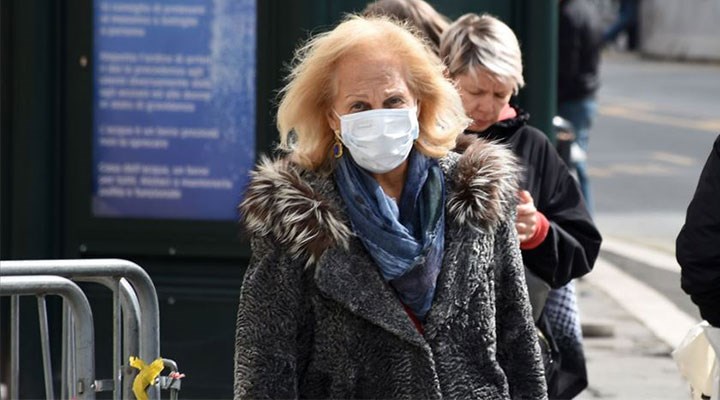Professor Markus Promberger: The virus is of course not classless

UĞUR ŞAHİN
Germany is one of the 10 countries where coronavirus is most common. More than 183 thousand people have been caught in Covid-19 so far in Germany, 8,605 of them lost their lives.
“The virus is of course not classless,” said Markus Promberger, professor of Sociology at the University of Erlangen in Nuremberg, Friedrich Alexander
Professor Markus Promberger, interviewed by Uğur Şahin for BirGün.
Uğur Şahin: First of all I would like to ask: How is your story of “social meeting” with the coronavirus? How were measures and aids reflected to the public in Germany?
Markus Promberger[1]: It was somehow strange – in early February I was coming back from a trip to spain, crossing six airports, developing heavy respiratory syndroms a few days later – but despite all my efforts was not tested. Half of the experts said that Covid-19 is just another seasonal flu not worth any worry, the other half told me I would not fit into the test algorithm, as I have neither been to China not met people returning from China, although the virus had reached Italy and Austria at that time, but had not been officially declared a risk zone. This is a bad example of bureaucratical inertness, and it well reflects what people thought at that time. I then put myself into quarantine for two weeks on own decision, sent my office colleagues into home office, my son’s school was closed soon thereafter due to a Covid-19 case, then there was the official homeoffice order from my institute and the general shutdown came one week later. Slow reaction and disbelief were first.
U.Ş.: The first official coronavirus case in Germany was detected on January 27. At least 169. 430 people were infected with the virus, 139.900 people recovered, and 7.392 people lost their lives. Your country was among the countries exemplified by low mortality in this process. So is it really so?
M.P: Yes, as far as I know, this was and still is correct. There are a few differences in casualties measurement between the different European countries, mainly about ascribing corona as a death cause or as ‘associated with’ a certain death case, but they were soon solved by agreeing on the second one. There might be differences between countries about whether dead persons are going through an obligatory autopsy or not, so in Germany we might report the dead cases who have been to a hospital before. But the nature of the corona disease is that the very most people try to get to a hospital when the symptoms get serious. And in Germany, other than the US, they will get a hospital treatment no matter if they are rich, poor, whatever. So this does not explain the low mortality. There are two very strong reasons for this low mortality. One raised by epidemiologists was that the virus was carried to Germany mostly from Austria and mostly by a relatively young and physically fit subpopulation – the skiiing tourists. And it stayed largely within this subpopulation for a relatively long while. The second strong reason is that there never was a real shortage in hospital beds enabled for intensive respiratory treatment and medic staff. From the first moment the Government realized the size of the challenge, and the epidemiologists made their first estimations, they realized that the number of intensive care hospital beds could soon become the first bottleneck for adequate treatment, and the staff able to work under these conditions the second. This is one of the reasons why the Chinese and Russian governments knocked up complete hospitals in their hotspots. The German government did not have to do that, but they reorganised the complete hospital and rehabilitation business to give way for infection treatment, and intensive care patients. Thus they managed to raise the previous nationwide number of 20.000 intensive care hospital beds to about 38.000. A socially inclusive health system and good intensive care is the key to low mortality. Luckily, due to the success of the shutdown in flattening the infection rates, Germany never needed all those beds so far, and was even able to treat patients from Italy and France.

U.Ş.: What is your observation of the latest situation in the country? How people spend their time in quarantine?
The thing is, that quarantine and shutdown effects are no longer very visible. And the shutdown never was a strong one. At the heigth of the shutdown, people were in homeoffice, caring for their kids at home, doing puchases of daily life, others going to work, if their companies still open. But at the same time, they went to parks and public places and tried to spend time outdoors – which caused some trouble here and there. Presently, there is quite a lot of release of the shutdown regulations, and often little individual responsibility in the public in terms of keeping distance, infection numbers are again rising a bit, but still mostly subcritical. When in quarantine people do homework or homeoffice work, use the internet, but suffer a bit from having no contacts outside the close family. There is great solidarity by civil society to support those who can’t leave their homes, elderly or quarantine persons.
U.Ş.: The low purchasing power of the people and the lack of a saving or an additional budget that can combat the virus makes it impossible for the poor to implement quarantine conditions in the long term. So what is the situation in Germany? What is the majority and feature of the sections that survive under these conditions?
I have to say, there are little observations of that kind in Germany. Low-income persons can do their daily shopping themselves, and if in quarantine, their relatives, neighbours or civil society organisations do. If they become unemployed, they get benefits from unemployment insurance or other parts of the welfare system. It is just that the poor have to live on their welfare entitlement alone now. They cannot get additional subsidiary goods, such as from foodbanks or charities, as most of them are closed, as they are usually run by elderly volunteers who are now a risk group. Or they can’t leave home as they are in quarantine. These are bad conditions, but nobody will die of hunger, as there is at least the welfare benefit, nobody will be expelled from home, as all such actions have been suspended. Nevertheless, the psychic pressure to leave home is higher in the urban less well-off neighbourhoods, when people live in very small and crowded flats. On the other hand, the homeless have some special problems, as their daycare units, sleeping places and soup kitchens have mostly been closed, and streetwork is very reduced. But many of them have the chance to move into a temporary home now, or enroll into a programme leading them out of homelessness. Nevertheless, the last word concerning homelessness is not spoken in that issue, see next question. Generally, people who have more personal space around them can more easily cope with the restrictions of quarantine and shutdown. This does not necessarily have to be a strong rich/poor division, as rural poor have more space than urban middle class, but there is at least more than just a loose connection. We can also observe protests by child protection and womens rights activists and professionals who fear a rise in domestic violence by having to stay at home, and there is a fear of career disadvantages for women by having to take care of their children during the shutdown of childcare units. But I have to say, the stronger and consistent the shutdown is, the more effective it will be, the shorter it will be, and the less are the long-term consequences. We have – by nature of the problem – little evidence for a significant rise in domestic violence or female carreer ruptures, but we have at least some historical evidence on the effects of shutdown policies.
U.Ş.: In the UK, where at least 28,446 deaths due to coronavirus have been recorded, death rates in the epidemic are higher in the poorer regions of the country, according to a study by the National Statistics Office (ONS). Britain is just one example and it is possible to multiply it… For example, Brazil; here the most natives of Covid-19 were affected. What can you say about the groups affected by the virüs in Germany?
Virus infections are far from being classless, of course. But the German health care system is mostly operation on a solidarity basis, and there are few persons without access to the healthcare systems. Nevertheless, there are groups that are known to be extremely vulnerable, some due to class and inequality status, some due to personal conditions, some to both. Among these are homeless, inmates of elderly and care homes, prisons, shelter homes, workers living in workers’ dorms or work under extremely bad conditions, like the immigrant meat factory workers in some districts of Northern Germany. Generally, people above 60 years of age, and people with cumulating health problems, like cancer patients, people with chronical respiratory disorders. There have been dangers of increased infection rates due to superexposition and bad protection gear among medical staff, and there is some evidence supporting this, but not dramatically, and not in terms of casualties, other than we know from our Italian neighbours. Nevertheless, we could also talk about people indirectly concerned, such as by the economic shutdown, or by the reorganisation of the health sector....
U.Ş.: How is the coronavirus picture in locations where poverty is intense in your country, in the suburbs, in the factories and in areas with lower income citizens? At this point, there are also questions such as "Is the virus or poverty killing?". What is your approach?
We do not know too much about it so far, as there is no good data available, but this will change – and might be a matter of discussion for the coming years. Nevertheless, we know something about the extremely vulnerable, as said above. Aside that, the association with class or poverty is not that big in Germany as it is in some other countries like the US, just being poor does not exclude anyone from access to standard healthcare. But there might be an association between badly paid jobs, being low skill male (delivery driver, meat industry worker), mid skill female (like nurse, supermarket cashier, gastronomic worker), high infection exposure, higher health risks, worse living conditions like in terms of housing, lower pensions at later old age, less life satisfaction and life expectancy. That is just a hypothesis for now, which I hope may not prove true later, when I think of the people concerned. I would not call it poverty, some of them might be poor sometimes, but it is in general more a low-income-high-risk-situation, in which under average social and working conditions, respective life-risks and the virus might negatively accumulate.
U.Ş.: Problems leading to the outbreak days for poor citizens and immigrants living in Germany; a narrower living space, difficulty in accessing cheap food, and inadequate supports. How would you summarize the conditions that forced the citizens of Germany in their pandemic days? What is the situation especially for immigrants?
Many things answered above, just a few comments on immigrants: If living in a camp or collective home, the situation in terms of infection risks or lack of space is very difficult, certainly. There have been some hot spots of infection reported for immigrant agricultural workers and for immigrant meat factory workers, all living in collective homes. But by far most immigrant workers in Germany live with their family in a family flat in an urban low- to middle-income neighbourhood with good infrastructure for daily life, it is mostly the problem of little housing space and sometimes subaverage housing quality – which leads to more people on the street in immigrant neighbourhoods in spite of the shutdown.
U.Ş.: Nearly two million children receive social assistance from the German state. Do you agree with the assessment that low-income and poor families are more affected by the crisis? If you agree, could you give us your observations about Germany?
See above. It might turn our that they habe more health risks, but we can just hypothesize that. But in terms of economic participation, they might go into worse times again, after a long term of prosperity and good labour market chances. This counts even more where low income is associated with low skill level and less educational participation for the kids. And, different to other crises, self-employed and service workers are more affected, the more simple or the more physical the service they offer is. Hairdressers, cosmetics workers, restaurants, caterers, all of them are already facing bad times, economically.
U.Ş.: I have read some news that some charities that provide childcare, education support and free food in Germany have to stop their activities during the epidemic days. How did this affect the public?
M.P.: Yes, this is true, but I have to say, the public wasn’t affected too much, except for the closure of childcare units, which forced many couples to rearrange their childcare responsibilities. Interestingly, these issues were not raised by the poor and their activists, but by well educated middle classes, and argumentatively associated with the fear of female career ruptures.
U.Ş.: How do you evaluate the state and local governments in Germany in providing assistance to disadvantaged groups in the fight against coronavirus?
M.P.: Disadvantaged groups: Not much problems in terms of healthcare and testing access, more problems in terms of economic participation. Nevertheless, there are huge government efforts in distributing unemployment benefits and short term wage subsidies – they move millions of Euros in that respect, sometimes bureaucratic and not too fast, but they do. Excluded groups, see above. Reaching and pulling in the homeless seems to me the most difficult issue, but the problem of homelessness in Germany is smaller than in some other European countries. Remarkably, care homes and elderly homes have proved to be infection hotspots and were relatively unprepared to cope with that.
U.Ş.: The reason why the death rate in Germany is so low is thought to be a wonderful health system. However, it is known that Germany does not currently have a great public health system to survive this crisis. Can you provide information about the health system in your country is not sufficient and sufficient?
I do not think a health system in general could be something like wonderful, this term is for me more associated to utopia than to any real-world situation. It has often blamed for being too expensive, and for things like privatization, standardized budgeting and accounting – like one case of one sickness enables the hospital to bill a standard sum to the health insurance, no matter how severe the case actually was, and which resources the hospital has actually used. It has been blamed to be too technical and less human, and to be too focused on standard instead of alternative treatments. But all these criticisms do not count that much in the face of such a crisis. The coverage of the public health insurance is very high, almost everyone has access, there is public control also over private hospitals, and there is not much, if any quality difference in vital treatments, whether funded by the public or by a private health insurance. The only thing it can be blamed for now is that a pandemia did not play any major role in their crisis scenarios and rehearsals – but the whole administration and public sector might be to blame for this. On the other hand, after some initial delays, government and administration acted relatively quick and precise, with great effort and success in scaling up the health system to be able to cope with the pandemia, enhance testing capacities, and the like.
U.Ş.: What happened in Italy, Spain and the USA due to the epidemic shows that neoliberalism is bankrupt. What is your approach? When the pandemic ends, what awaits Germany citizens, especially for the poor?
Actually, neoliberal policies might have contributed to weakening the health systems in Italy and Spain, but in Greece which faced the heaviest austerity measures during and after the Great Recession of 2007/8 is performing relatively well in the Covid-19 crisis. Thus it can’t be neoliberalism alone to blame. The US federal government might be thought of as neoliberal, but I think it is more chaotic, misled and populist-nationalist than anything else. Any straight neoliberal would not have imposed such restrictions on immigration from Latinoamerica and on international trade.
What will happen to the less well-off in Germany? One possible negative scenario is that GNP growth gives way to GNP lossesbetween 5 and 10%, unemployment rates grow again and stay at a higher level for several times, like they used to be before the extraordinary prosperity period we have seen since about 2005, with just a minor dip in 2007/2008. The German welfare state and German citizens can cope with that. It is and will be a severe crisis, and life on a low income won’t get easier. But presently, the German government is taking a very Keynesian way to buffer the crisis, generously giving support money to companies, wage subsidies to employers, cheap loans to other companies, refrains from any cuts in the social system, even expanding it - and thinks whether to set up a social protection package for small enterprises and self employed. From my point of view, this policy is even a bit too unstructured and unselective. I think, more weight and more support should be given to innovative new businesses in the fields of green economy, healthcare industries, good biotechnology, sustainable energy generation, and digitalisation, as a crisis is always a chance for innovation. But any innovation should be socially inclusive, moreover, wage structures should be thought over, if they really compensate low-wage employees for the risks they take in their jobs. Nurses, delivery drivers, workers in retail trade are notoriously underpaid in Germany, and it was mostly an expression of solidarity, hardly driven by incentives, that thousands of ex-hospital staff went back to support their former colleagues and their patients.
Concerning the bankruptcy of neoliberalism – I think the issue is a bit more complicated. I could say a lot on this, but let me give you one point: I doubt if Germany was ever completely neoliberal. There has been some anti-union legislation in the 1980s, but with little effect, as the unions are still there. There has been some privatization of public assets in the 1990s, there have been new public management ideas in the early 2000s, implementing pseudo-markets in hospitals and universities, even some sewage treatment plants of middle-sized cities were sold to private US holdings and rented back, but there is still public control and debate about many issues, following more corporatist, conservative and social democratic policy patterns than neoliberal ones. Even huge private housing companies are sometimes getting under pressure for their gentrification activities when demonstrations call for transferring their capacities into municipal control, and if and where working class and municipal housing cooperatives offer housing for lower prices. So, I think, we’d better not use the German example for blaming neoliberalism. Don’t mistake me. I think that precarious labour and the increased commodification of the housing market are very neoliberal, creating a lot of social problems, also in Germany, but there is a also lot of social democratic, green and conservative policy, reaching from basic income policies, an unemployment insurance paying job loss compensation transfers at least for one year, easy to acces basic income support, anti-pollution programmes, nature protection, public goods, the exit from nuclear energy use, all of which does not really fit into the scheme of neoliberalism. And there are a lot of mainstream politicians really focused on well-being, protection of the citizens and their rights, and keeping up good policy debates, while some extreme liberals are slowly moving to joining sides with extremists, conspiracy theorists, anti-vaccination activists and right wing protagonists. It is absolutely correct to say that the covid-19 crisis demonstrates once more the necessity for good governance, easy-to-access public goods, resilient public service institutions which support the resilience of society and all of its members, in those days mainly on the health issues. And it is correct to state that neoliberal policies and recipes (such as isolating the risk groups instead of the sick) do not help society in such crises.
(1) Prof. Dr. Markus Promberger, IAB and University of Erlangen






